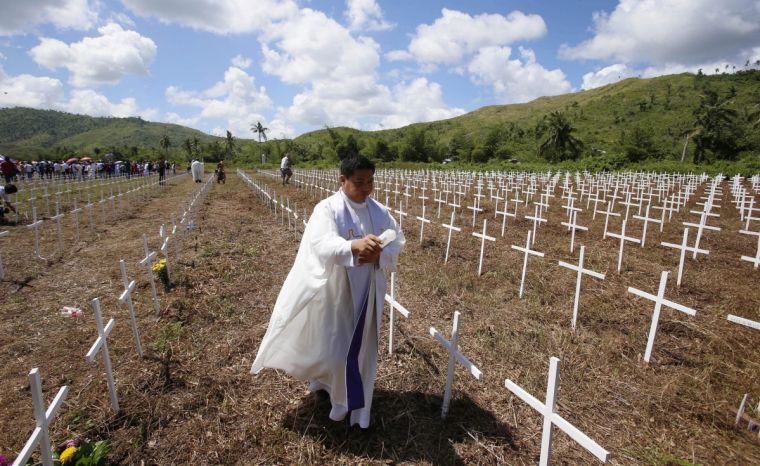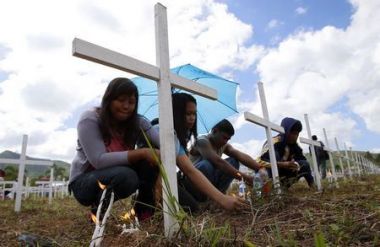Church bells toll as Philippines remembers thousands killed a year after typhoon Haiyan

Candles lit up the streets of the central Philippine city worst-hit by the strongest storm to make landfall as thousands remembered more than 6,300 people who died a year ago when typhoon Haiyan smashed into the country.
Before dawn on Saturday, more than 5,000 people holding white balloons and candles mournfully walked around the regional capital Tacloban City, passing through areas flattened by Haiyan's 250 kph (155 mph) winds and seven-metre high storm surge.
Church bells peeled and sirens wailed at the start of a Roman Catholic mass at the city's almost half-hectare mass grave site where nearly 3,000 people storm victims are buried. Hundreds are still unaccounted.
"It's important that we make it meaningful, so for the next generations people will remember this," the city's mayor, Alfred Romualdez, told Reuters.
Typhoon Haiyan wiped out or damaged practically everything in its path as it swept ashore on Nov. 8, 2013, destroying around 90 percent of the city of Tacloban in Leyte province.
More than 14.5 million people were affected by the storm in six regions and 44 provinces. More than four million people still remain homeless.

Hundreds of people, most of them fishermen, staged protests in the city on Saturday, demanding the government provide new homes and jobs, and accusing officials of diverting aid and reconstruction funds.
"We have felt a year's worth of the government's vicious abandonment, corruption, deceit, and repression, and have seen a year's worth of news and studies that confirm this situation," Efleda Bautista, a leader of People Surge, a group of typhoon survivors, said.
The protesters, some covered with mud to dramatize their plight, say they will burn a nine-foot effigy of the president later on Saturday in protest.
The government estimates it needs almost 170 billion pesos ($3.8 billion) to rebuild the affected communities, including the construction of a four-meter high dike along the 27-km coastline to prevent a repeat of the disaster.
President Benigno Aquino, in a visit to nearby Samar island on Friday, unveiled a plan to relocate Tacloban airport away from the coastline and the building of more than 205,000 permanent homes to resettle displaced families.
"This is not politics," Aquino told reporters, defending his government against criticism it was slow to respond to the disaster, citing reports showing reconstruction work was moving at a faster pace than the 2004 tsunami in Aceh.
"I would hope we can move even faster and I will push everybody to move even faster, but the sad reality is the scope of work you need to do can really not be done overnight."











